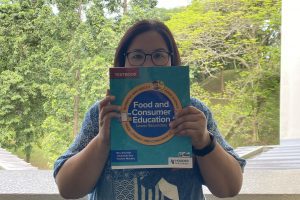Young Children’s Voices in Mathematical Problem Solving
Contributed by Dr Ho Siew Yin and Sng Wei Qin Abbie, from NTUC First Campus, for SingTeach Virtual […]
Read More
Renowned as a food paradise on an international scale, Singapore is home to countless cuisines ranging from street food and heritage dining spots to glamourous celebrity restaurants. According to the Singapore Food Agency, Singapore currently imports more than 90% of our food from more than 180 countries. While this has placed us in first place in the Global Food Security Index for the second year running in 2019, we are also vulnerable to emerging threats such as climate change and biodiversity loss. Dr Johannah Soo, Lecturer of Food and Consumer Sciences at NIE’s Natural Sciences & Science Education Academic Group, shares with us her views and findings from her research project on food resilience in Singapore, as well as what more can be done to change society’s perspectives on living sustainably.
 What is food resilience and why is it important especially for the younger generation?
What is food resilience and why is it important especially for the younger generation?Food resilience looks at how communities and families adapt to food availability, as well as cope with food crises and uncertainties related to the global supply and demand of food. It is closely related to food security, which looks at the availability of food, where the food is sourced from, as well as the resilience and reliability of food distribution networks at a societal level. Food security also considers the consumers’ affordability of food, food quality and safety, as well as the country’s sustainability and adaptation to impact of climate change.
According to the Singapore Food Statistics 2022 report (Singapore Food Agency, 2022), Singapore imports 90% of our food and 40% of our water. Singapore’s local agri-food sector only produces about 29% of eggs, 8% of vegetables and 4% of seafood – far from being sufficient to support local demands. Since we demand food to be imported and are susceptible to external drivers such as the endemic COVID-19 and geopolitical unrest, we are not food secure. For example, food prices have increased sharply in the last few years, creating a lot of stress on consumers. Hence, this poses a threat to household or individual food resilience.
Household food resilience can be measured from two aspects, Awareness and Preparedness. Awareness refers to having the knowledge on food imports such as impacting factors that contribute to food availability and cost, and the environmental sustainability of the food we consume. Preparedness means the ability to adopt readiness in the event of a food crisis and having access to public and private assistance.
Having a good knowledge of what food resilience is and being ready are important, especially to the younger generation. With the fast depletion of resources and an increasing world population, we need to educate everyone to be cautious of our food consumption. This is especially challenging for Singapore given our limited land and resources for food production. Additionally, as a highly urbanized country with little local agricultural production, people in Singapore may have been less exposed to the agriculture industry. Thus, we also need to accelerate the process of finding new methods to mitigate the situation, such as by employing new agricultural technologies to improve the yield and health of animals and crops.
Being a Home Economist, I have a mission! We must be an ambassador to advocate sustainable living via the most critical consumption, which is food. Humans need to drink and eat as these are our basic needs and it is important that we consume wisely. My field of study and research revolve around consumers’ perception and behaviours, from sensory evaluations and perception of Genetically Modified Food to sustainable food consumption.
“Nothing is too little to be thrown away – every bit adds up. In 2022, Singapore generated 813,000 tonnes of food waste.”
– Johannah, on the urgency of reducing food wastage in Singapore
Before the COVID-19 endemic, I conducted a survey on 600 participants and the results showed that consumers generally want to consume more sustainably. However, they were not keen or able to do certain things such as growing their own food, engage in barter trade, or plan meals according to their dietary guidelines. Many also reported that they had expired food in their pantry and were not buying environmentally-friendly food.
Another study on food waste among secondary and tertiary students showed that the main reason for not finishing the food they ordered and throwing them away was because they did not like the food served. Some lower secondary students reported that they were concerned about their weight and hence refused to finish their serving. The students did not feel “guilty” nor responsible about throwing away unfinished food since only a small amount of food was left.
Nothing is too little to be thrown away – every bit adds up. In 2022, Singapore generated 813,000 tonnes of food waste (Statista Research Department, 2023). Additionally, by not consuming a balanced diet at growing ages, it may lead to health issues or disordered eating in the long run. More could be done to educate students on these misconceptions, including learning more about meal planning, proper food storage and how to eat in moderation, which in turn will help to reduce food wastage.
Another way that the public can help to reduce food waste is to utilize tap water. While many may opt to purchase and drink bottled mineral water, drinking from the tap is generally safe in Singapore. These purchased bottles will add to the amount of waste. Lastly, there is a lack of consumers’ knowledge on food storage. For example, “best-before” dates provide an idea of how long the food will last before they lose quality, and they may not necessarily indicate that the food has spoiled. If stored properly, most food products still can be consumed after the “best-before” date.
These results inform us of the urgency to correct misconceptions in consumption, nutrition and health, as well as a need to increase consciousness of their actions.
To increase awareness and in turn, improve preparedness, is more than giving sound information. It takes a lot of effort to change the mindset and habits of consumers. This is a matter of having the right values and beliefs towards sustainable consumption, which will influence their intention and posit actual behaviours.
Environmental studies are already integrated into multiple subjects across various levels and many schools are actively working on environment-related projects for their Applied Learning Programme (ALP). More specifically, sustainable consumption is already included in the upper secondary subject, “Nutrition and Food Science”. Additionally, starting 2024, a new subject titled “Food and Consumer Education” will be made compulsory for lower secondary students from almost all mainstream schools.

Through subjects such as “Food and Consumer Education”, “Nutrition and Food Science”, as well as others, there is an urgent need to educate our young learners about food security. Schools are the most direct channel to reach out to our young ones, especially in their formative years and youth, so that they will get sound values and information. In turn, these values will lead them to be responsible adults and live sustainably.
References
Singapore Food Agency. (2022). Singapore Food Statistics 2022. Retrieved from: https://www.sfa.gov.sg/docs/default-source/publication/sg-food-statistics/singapore-food-statistics-2022.pdf
Statista Research Department. (2023). Total volume of food waste generated in Singapore from 2013 to 2022. Statista. Retrieved from: https://www.statista.com/statistics/961794/volume-food-waste-generated-singapore/